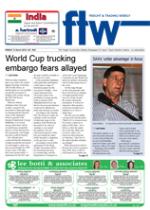This week’s special
International Trade
Administration Commission
column focuses on import
and export control.
For more information,
access the website at
www.itac.org.za
Import and export control
measures are generally
applied to enforce health,
environmental, safety, and
technical standards that arise
from domestic laws and
international agreements.
The International Trade
Administration Commission
has established partnerships
with several government
departments to provide a
stable legal foundation on
which to operate.
Import Control –
New goods
• Radioactive chemical
elements:
Control is exercised to assist
the Department of Health,
(radiation control) to control
and monitor the importation
of radioactive isotopes and
chemical elements.
• New pneumatic tyres:
To assist the National
Regulator for Compulsory
Specification to ensure that all
new pneumatic tyres imported
comply with the safety/quality
specification and have been
subjected to a process of
homologation.
• Chemicals listed in the
1988 Convention:
Control is exercised to assist
the SAPS in ensuring that
importers/exporters of listed
chemicals are recorded and
the movements of these
chemicals are adequately
monitored as required by
the Convention.
• Fossil fuels:
To assist the Department
of Mineral Resources in
regulating the industry for
the purpose of promoting
efficient manufacturing,
wholesaling and retailing of
petroleum products, to create
an environment for investment
and to create small business
and employment opportunities
in the industry.
• Arms and ammunition:
To assist the SAPS in
maintaining safety and
security.
• Gambling devices:
For social reasons and quality.
Used goods
• Used electronic
equipment:
To assist the Department
of Environment Affairs
to address the problem of
dumping of electronic waste.
• Used medical
equipment:
To assist the Department
of Health to address the
problem of inferior quality
used medical equipment being
imported such as used X-ray
machines.
• Used aircraft
To assist the Civil Aviation
Authority in recording used
aircraft being imported and
ensuring that the requirements
of airworthiness have been
complied with.
• Waste and scrap
The generation of waste and
scrap far exceeds recycling
programmes resulting in
many developed countries
being prepared to pay
developing countries for
receiving waste and scrap for
purpose of landfill.
In many instances however the
importation of waste and scrap
is allowed as it serves as a raw
material for manufacturing
purposes such as waste paper,
glass, rubber or lead. In all
these instances, however,
there must be compliance with
the provisions of the Basel
Convention.
Export Control
• Tiger’s eye and sugulite:
To assist the Department
of Mineral Resources with
strategies of beneficiation,
being the successive process
of adding value to raw
materials from extraction to
selling the finished products
to consumers.
• Raw materials for
manufacturing:
The exportation of ferrous and
non-ferrous waste and scrap,
for example, is controlled to
assist the local foundries in
acquiring ferrous and nonferrous
waste and scrap prior
to exportation.
• Assist strategies of
crime prevention:
The exportation of used
motor vehicles is controlled
to assist law enforcement
agencies in curtailing the
exportation of used stolen
motor vehicles.
• Control in terms of
international agreements:
Export control measures
are also exercised to comply
with the provisions of
international agreements
such as the Montreal
Protocol, Basel Convention
and the 1988 United Nations
Convention.
Import and export control
12 Mar 2010 - by Staff reporter
0 Comments
FTW - 12 Mar 10

12 Mar 2010
12 Mar 2010
12 Mar 2010
12 Mar 2010
12 Mar 2010
12 Mar 2010
12 Mar 2010
12 Mar 2010
12 Mar 2010
12 Mar 2010
Border Beat
25 Jun 2025
17 Jun 2025
Poll
Featured Jobs
New
New
